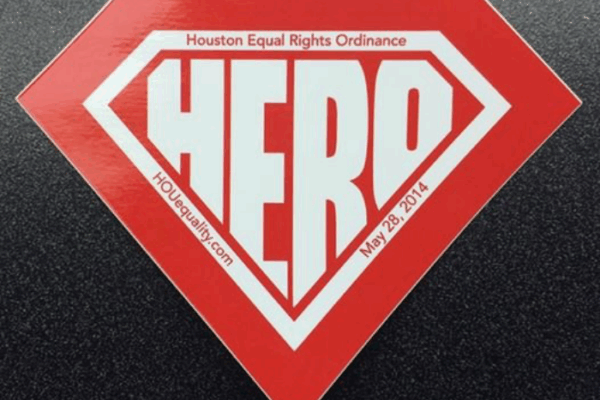The most diverse city in the country needs an equal rights ordinance.
Houston is the most diverse city in these United States. Just how diverse? We have no racial or ethnic majority. We have one of the largest—and quite frankly, one of the most architecturally breathtaking—Hindu temples in the country. Houston hosts the only livestock show and rodeo where you can hear over 100 languages spoken. We have the highest concentration of refugees in the U.S, from 78 countries around the world. And this year’s Pride Parade boasted a crowd 700,000 strong.
That’s just shy of 10 Reliant Stadiums at capacity.
Given our lively, kaleidoscopic diversity, one would think non-discrimination would be prominently enshrined in municipal law. And it was, for a time, until forces opposed to Houston’s Equal Rights Ordinance (HERO) secured a victory in the Texas Supreme Court to force it onto the ballot in November.
The fight to keep HERO alive is about Houston values—and the principle that everyone should be treated equally and fairly under the law. In order to see that the ordinance remains on the books, we must first understand exactly what it does.
First of all, the anti-discrimination ordinance protects all Houstonians from discrimination, whether they’ve been singled out because of their sex, race, sexual orientation, religion, or gender identity. It protects veterans who don’t want to be discriminated against because they served their country. It protects pregnant women, the disabled, and the elderly. And without it, a Houston company’s best and most conscientious employee can be legally fired simply because he or she chooses to come out to co-workers.
Of course, some of these categories are protected by other laws, but HERO provides a local venue for resolving discrimination complaints that is timely, effective, and affordable. Without the benefit of HERO, those who are fired or denied housing or public accommodations simply for being who they are literally have to make a federal case out of it. More often than not this process requires a lawyer, and the time it takes to right the wrong—which is by no means a foregone conclusion—is usually measured in years.
While Houston is proud of its diversity, discrimination remains a reality: Between the day HERO was passed and the day it initially went into effect, 54% of the discrimination complaints lodged with the Office of the Inspector General related to race, 17% to gender, 15% to age, and 4% to sexual orientation or gender identity. Our gay, lesbian, and transgender neighbors need the anti-discrimination protections the ordinance brings, but it simply isn’t true that its scope is limited to them. The Houston Equal Rights Ordinance protects everyone.
HERO protects you.
This is why HERO enjoys widespread support from over 80 current or former city officials, from community organizations and non-profits, and over 70 local faith leaders. It has been endorsed by the Greater Houston Partnership, the Houston Association of Realtors, Rice University, the League of United Latin American Citizens, and the NAACP.
And no wonder. Diversity is one of Houston’s greatest strengths, and it’s essential we do everything in our power to preserve and protect that diversity. HERO promotes what Houstonians value most: fair treatment for all, no matter who you are.

